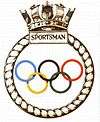HMS Sportsman (P229)
 | |
| History | |
|---|---|
| Class and type: | S-class submarine |
| Name: | HMS Sportsman |
| Ordered: | 14 October 1940 |
| Builder: | Chatham Dockyard |
| Laid down: | 1 July 1941 |
| Launched: | 17 April 1942 |
| Commissioned: | 21 December 1942 |
| Out of service: | Lent to the French navy on 8 July 1952 as La Sibylle |
| Fate: | Sunk off Toulon on 24 September 1952 |
| General characteristics | |
| Displacement: |
|
| Length: | 217 ft (66 m) |
| Beam: | 23 ft 6 in (7.16 m) |
| Draught: | 11 ft (3.4 m) |
| Speed: |
|
| Complement: | 48 officers and men |
| Armament: |
|
HMS Sportsman was an S class submarine of the Royal Navy, and part of the Third Group built of that class. She was built at Chatham Dockyard and launched on 17 April 1942. So far she has been the only ship of the Royal Navy to bear the name Sportsman.
On 8 July 1952 she was lent to the French Navy who named her La Sibylle. She was in service briefly, for just 11 weeks, under the command of Lieutenant de Vaisseau Gustave CUROT, being lost in the Mediterranean with her crew of 47 on 24 September 1952, at a depth of 700 m off Cape Camarat (on the St Tropez peninsula in the Var). During exercises with the escort-vessel "Touareg" she was at minimum depth of 30 metres, changing course by 30° every 10 minutes. Having dived at 0743, "La Sibylle" was attacked for a first time at 0752. During a second attack, ASDIC contact was lost at 0802 at 270 m distance, just before the "Touareg" was vertically above her. Contact was never regained, The submarine's buoy was seen at 0815, probably because the buoyancy of the buoy broke its retaining cable when the submarine was crushed by the sea pressure on the hull. No external collision, explosion or other noises (such as that of blowing main ballast) were detected by "Touareg" or by the submarine "Laubie" patrolling in a neighbouring sector. No mention was made of any practise depth-charges which might have been fired by the "Touareg", nor of any break-up noises of crushing at depth (which would have occurred long before "La Sibylle" reached the bottom at 700 m).
Career

She spent most of the war in the Mediterranean, where she sank the French passenger ship Général Bonaparte, the Italian merchant Bolzaneto, the Italian fishing vessels Angiolina P and Maria Luisa B, the Italian sailing vessel Angiolina, two Greek sailing vessels, the Bulgarian troop transport Balkan, the small German tanker MT 3/Vienna, the German sailing vessel Grauer Ort and the German merchant Lüneburg (the former Greek Constantin Louloudis). Sportsman also sank the German transport Petrella (the former French Aveyron), despite its being clearly marked as a POW-transporter. 2,670 out of 3,173 Italian Prisoners of War who were aboard the Petrella were killed. The German guards did not open the prisoners' rooms and fired at them when they tried to break out.[1]
Sportsman also damaged the Greek sailing vessel Spiridon and attacked a landing craft with gunfire. The attack had to be broken off because the gun jammed. She also fired six torpedoes at the French tanker Marguerite Finaly. The torpedoes missed their target.
Sportsman survived the Second World War and was lent to the French Navy on 8 July 1952, being renamed Sibylle. She was lost off Toulon on 24 September 1952. The entire crew of 47 officers and men went down with the boat.
References
- ↑ HMS Sportsman, Uboat.net
- Colledge, J. J.; Warlow, Ben (2006) [1969]. Ships of the Royal Navy: The Complete Record of all Fighting Ships of the Royal Navy (Rev. ed.). London: Chatham Publishing. ISBN 978-1-86176-281-8. OCLC 67375475.
External links
Coordinates: 43°01′N 7°40′E / 43.017°N 7.667°E